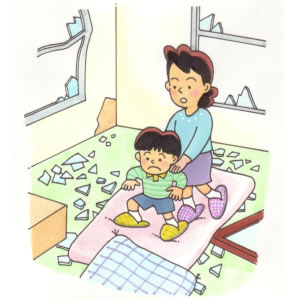
Heres the last installation of how your family should prepare for an earthquake – what to do if when it is happening and after. I know its an awful prospect, but if like me, you’ve been through one, it really does make sense to give preparation and planning some thought.
In a nutshell, when there is an earthquake happening, if there is only one rule to remember its to TAKE COVER AND STAY THERE.
1. If you’re inside your home, stay there. Get out of the kitchen… safer places are inside halls, in corners, in archways. Take cover under a heavy table, desk or any solid furniture that you can get under and hold onto. Protect your head and face. Doors may slam on your fingers if you’re in a doorway. Avoid areas near windows.
2. If you’re in a yard outside your home, stay there and get clear of buildings and wires that could fall on you.
3. Don’t go outside where you may be hit by falling debris… sidewalks next to tall buildings are particularly dangerous.
4. Avoid elevators… if you’re in an elevator when an earthquake happens, hit all floor buttons and get out when you can. High rise residents will hear fire alarms go off and electricity may fail.
5. If you’re in a vehicle, pull over to the side (leave the road clear), away from bridges, overpasses and buildings. Stay in your vehicle.
6. If you’re in a crowded public place, take cover and watch that you don’t get trampled. In shopping centres, take cover in the nearest store and keep away from windows, skylights and display shelves of heavy objects.
7. Remain in a protected place until the shaking stops. Anticipate aftershocks… they may occur soon after the first quake.
8. Try to remain calm and help others.
After the earthquake
Preparations for an earthquake also include knowing what to do, and not to do, after the shaking stops… when there is danger from after shocks, fires, falling building materials, debris, etc. Remain calm. You may have to take charge of others. Take care of life-threatening situations first. Remember, you may be on your own for 72 hours or more.
1. Check your home for structural damage and other hazards.
2. Check yourself and others nearby for injuries… administer first aid quickly and carefully.
3. If you are evacuating, locate and take your pack of emergency supplies with you.
4. Use a flashlight to check utilities and do not shut them off unless damaged. Leaking gas will smell. Don’t light matches or turn on light switches… until you are sure there are no gas leaks or flammable liquids.
5. Wear sturdy shoes, gloves and protective clothing if it’s winter and/or if there’s debris, particularly broken glass.
6. Check your neighbors after looking after your own family. Your first help after an earthquake usually will come from family and friends.
7. Confine frightened pets.
8. Don’t flush toilets if you suspect nearby sewer lines are broken.
9. Secure your home against intruders.
10. Turn on your battery-powered radio (or car radio) and listen for broadcast emergency instructions.
11. Don’t use your telephone, except in an extreme (life-threatening) emergency.
12. Stay at least ten metres from downed power lines.
13. Avoid waterfront areas because of the threat of large waves (tsunamis).
Planning for earthquakes will also help prepare you for many other emergencies.
Be prepared, not scared!
[tags]Earthquake,Earthquake Tips,Keeping safe,disaster preparation[/tags]
Originally posted on November 8, 2006 @ 6:55 pm